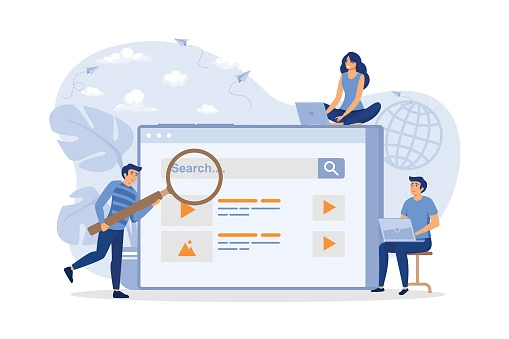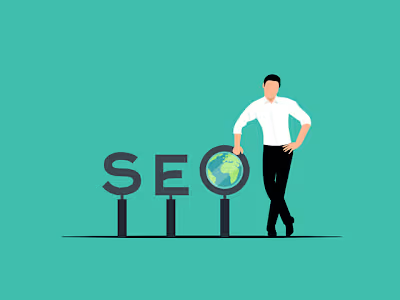Paid or Organic Search? A Comprehensive Guide for Small Busines…
Are you looking to boost your business's online visibility and attract more visitors to your website? If so, you may be wondering whether organic or paid search is the way to go. In this blog post, we'll delve into the differences between the two approaches. Organic search, or SEO, involves optimizing your website so that it ranks higher in search engine results. Meanwhile, paid search, or SEM, requires you to pay for ad space on search engine results pages. Both options have their own advantages and disadvantages, and choosing the right one for your business depends on various factors such as your goals, budget, and resources. But don't worry, we'll cover all of these factors in detail to help you make an informed decision about which strategy is best suited for your business. So, let's dive in and explore the differences between organic and paid search.

Organic Search Marketing
If you're looking to increase your website's visibility and attract more visitors, organic search can be a highly effective strategy. By optimizing your website for search engines, you can improve your chances of showing up in the top search results for relevant keywords. This means that people are more likely to find your website and click through to it.
Organic search marketing, also known as search engine optimization (SEO), involves implementing various techniques to improve your website's natural rankings on search engine results pages (SERPs). Search engines use complex algorithms to rank websites based on their relevance to the keywords entered by users. Therefore, organic search marketing involves optimizing your website's titles, tags, Meta descriptions, URLs, keywords, and content to make sure they align with the needs and interests of your potential customers.
SEO is a long-term strategy that requires consistent effort and attention from the person responsible for maintaining your website. It may take several months or more for your business to achieve front-page rankings, and even then, ongoing maintenance is necessary to maintain your position. However, optimizing your website can yield results in terms of increased traffic and customer interest from the outset.
While organic search marketing requires a significant investment of time and resources, it can provide numerous benefits for your business. By improving your website's rankings and making it more visible to potential customers, you can establish your brand as an authority in your industry and attract more leads and sales over time.
Tips for a Successful Organic Search Campaign
When choosing keywords for your website or blog, don't just rely on popular ones. Use more specific keywords that relate to your product or service. Over time, search engines like Google will recognize your website as a go-to source for that particular topic, which will boost your content in search rankings and attract your ideal audience. This approach will establish you as a thought leader in your niche.
To optimize your web page or blog post, ensure that your Meta title, URL, and description are all optimized. While there are many tools available to help with on-page SEO, such as Yoast SEO plugin, HubSpot's SEO tools, and Ahrefs, it's essential to work on each page individually.
Incoming links from other trustworthy sites are a strong signal to Google that your website is authoritative. Encourage clients, partners, friends, and family to link to your site, but beware of spams links from low-reputation sites, which can actually harm your SEO.
Paid Search Marketing
Paid search marketing enables advertisers to purchase an immediate ranking on a search results page, placing their ads above the organic search results and other SERP elements like featured snippets or "people also ask" sections.
This marketing method is commonly referred to as Pay-Per-Click (PPC) advertising since advertisers only pay when someone clicks on their ad. Text ads are the most prevalent form of PPC ads, but product listing ads or display ads with images can also be employed on partner websites.
In a PPC campaign, advertisers focus on improving their ads' quality scores and keyword relevance to landing pages. By doing so, they can obtain a better ad rank and reduce costs from the three available positions on a SERP.
Tips for a Successful Paid Search Campaign
To maximize the effectiveness of your advertising, create a focused structure that separates each group of products into its own ad category. For example, if you run a sports store, your swimming product ads should look different than those for baseball. Ensure that your ads are tightly targeted and aimed at a specific niche. Rather than using a broad approach, aim to attract your ideal customer and reel them in quickly.
Identifying your best keywords is a crucial step in any ad campaign. Make sure your keywords have two key components: a high click through rate and a high conversion rate. Continuously assess which keywords are generating the most income and focus on those. Explore similar keywords with the same meaning. Think of investing your budget in proven winners. If spending $1 on a pay-per-click term yields a $2 profit, spending $100 to make $200 makes sense.
Prevent your ads from wasting resources and draining your budget by identifying and building a list of negative keywords. For instance, if your sports store doesn't sell golf equipment, you want to avoid having your ads appear when someone searches for golf clubs. Although you won't be able to eliminate all negative phrases, you can refine and edit your negative list regularly to minimize waste.
Keep your ads fresh to ensure they grab readers' attention and encourage clicks. The main goal of any ad is to prompt the reader to take action. Constantly test, tweak, and improve your ads. Different words will appeal to different people, so never be satisfied with your ad. Remember that settling for an ad can leave money on the table.
Paid or Organic Search: Which is Right for Your Business?
The choice between paid search and organic search depends on the goals and budget of a business. For businesses with time-sensitive promotions and a larger budget, paid search is an ideal option as it offers immediate results and precise targeting. On the other hand, organic search provides long-term benefits and is cost-effective, making it an excellent option for businesses seeking to increase their visibility over the long term.
1- An optimal digital marketing strategy should include both paid and organic search tactics.
2- Paid search can drive immediate traffic and sales, while organic search can provide long-term benefits.
3- User experience should be a priority when crafting effective digital marketing strategies.
4- Businesses should ensure their website is mobile-responsive, loads rapidly, and delivers pertinent and superior content to users.
5- The guide provides a step-by-step approach to optimizing a website for search engines, including tips for keyword research, on-page optimization, and link building.
6- Staying up to date with the latest trends and best practices is essential for creating successful digital marketing campaigns.
7- Combining paid and organic search tactics can help businesses reach their target audience effectively and provide a higher return on investment.
To sum up, there are advantages and disadvantages to both organic and paid search, and the ideal approach for your business will depend on various factors, including your goals, budget, and resources. By comprehending the distinctions between the two, you can make an educated decision that will aid in driving traffic and expanding your business.
Like this project
Posted May 22, 2023
difference between organic and paid search marketing. Tips for a Successful Organic Search Campaign. Tips for a Successful Paid Search marketing.





